News Brief Archives |
News Brief Archives |
|
 |
Seattle Stranger analyzes monorail demise (11/17/05) Seattle, Washington. The Stranger, Seattle’s “alternative” newspaper, has published a special issue that explores the reasons for the demise of the Seattle Monorail Project (SMP). The newspaper has been a supporter of the grassroots-produced project since its beginnings in 1997. Articles and interviews in document missteps of the SMP monorail agency, its predecessor the Elevated Transportation Company (ETC), and the lack of support from “Mayor Gridlock” Greg Nickels and City Hall leaders. Hypocrisies are pointed out with the Mayor’s complaints over financing for the monorail, yet at the same time he currently promotes an under-funded “Big Dig” sub-surface freeway along the city’s waterfront. The one-mile tunnel is estimated to cost over $4 billion and will result in more automobiles and carbon monoxide emissions in the downtown area. Seattle Stranger, Monorail R.I.P issue. Mayor Gridlock website |
|
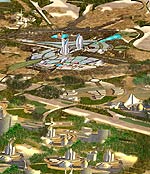 |
Dubailand
Monorail planned (11/15/05) |
|
 |
Seattle votes to end project (11/8/05) Seattle, WA. Seattle has joined the list of USA "should have-could have" cities of Los Angeles, Houston and Honolulu. Those cities all came very close to having monorail systems, yet politicians in each case managed to prevent them from being built. Voters today said no to Proposition One, which in effect brings the Seattle Monorail Project (SMP) to a close. As has been well documented in our News Briefs, the project went into a tailspin starting in June when the details of the SMP contract with Cascadia Monorail Company were revealed to the public. Monorail opponents were suddenly armed with the weaponry they needed to kill the project. The system didn't look like the concept originally sold to citizens, and financing the project would require much more money than originally promised. Politicians that had supported the monorail because of political expediency worked fast to take advantage of SMP's and Cascadia's misteps. Some monorailists are vowing to put forth better proposals for monorail in the future, but they face significant challenges considering that monorail-the technology, now has a scarred image with the public while monorail-the politics, was the main reason for the downfall. On the plus side for monorail enthusiasts, the historic Seattle Center Monorail will continue to run between Westlake Center in downtown and Seattle Center. It's the only monorail in the world to still operating with Alweg Company-built trains. The monorail was the technological precursor to many monorails in Japan, Kuala Lumpur as well as several other planned systems. It was scheduled to be demolished for construction of the 10-14 mile Green Line monorail system, yet will now continue to shuttle back and forth on its one-mile journey. The Monorail Society (TMS) salutes everyone in Seattle involved in promoting and working for a citywide monorail system over the past ten years. That includes monorail activists including Dick Falkenbury and Peter Sherwin; leaders, board members and staff members of the Elevated Transportation Company and Seattle Monorail Project; and the contractor teams of Cascadia and Team Monorail that invested a great deal of money and time in Seattle. TMS will continue to support those who will carry on the efforts for monorail, whether in Seattle or elsewhere in the world. |
|
 |
Seattle votes on monorail again (11/8/05) Seattle, WA. The grassroots effort for a monorail system in Seattle is on the line again today with Proposition One. Voters have said yes four times to building a monorail system since 1997, yet the tide has turned against the project this year, according to recent polls. Opponents of monorail seized upon the opportunity to kill the project when a controversial financing plan was announced this summer and art renderings of bulky monorail trains, track and stations were revealed by Cascadia Monorail Company. If Proposition One passes, a 10-mile starter line project will move forward. If the proposition is voted down, properties acquired by the Seattle Monorail Project will be sold off and the project will shut down. However, motor vehicle taxes would still be collected. It is expected that if the monorail proposition fails, Seattle politicians will embrace light rail as be the solution to deal with traffic problems, for stated reasons of having a unified rail system with Sound Transit. Ironically, many cost estimates for light rail construction dwarf the price for monorail, because of the necessity to build much of the system as subway in the hilly, congested city. Angry at costs, voters likely to derail Seattle monorail plan. USA Today, 11/7/05. Transit over roads-Vote Yes on monorail Stop SMP-Vote No on monorail |
|
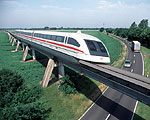 |
Transrapid proposed for Holland (11/6/05) Transrapid
proposes Dutch maglev train project. Forbes, 11/4/05. |
|
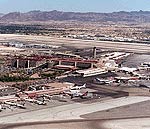 |
Las Vegas airport extension study
OK'd (11/3/05) Las Vegas, NV. The Clark County Commission has given the Las Vegas Monorail Company approval to do a feasibility study for a system extension to McCarran International Airport. The study will look at different routes from the Strip to the airport as well as consider whether the approximately two-mile line would be beneficial or not. Las Vegas Monorail CEO Curtis Myles said, "The airport today brings in 56,000 people, about 80-percent are destined for locations between Russell Road and Sahara Boulevard, which is where our current system operates." The current four-mile monorail carries about 30,000 passengers per day. Myles and other monorail officials believe the airport extension would increase the system’s ridership dramatically. If the extension project moves forward, opposition is expected from taxi cab companies. Las Vegas Monorail would like to build the extension in coordination with construction for a third terminal at McCarran. |
|
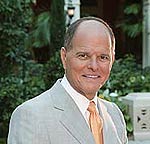 |
MGM head is big fan of monorail (10/31/05) Las Vegas, Nevada. MGM Mirage chairman and chief executive Terry Lanni has high praise for the Las Vegas Monorail. He told Las Vegas Sun columnist Jeff Simpson that the company has benefited tremendously from the monorail. He said, “It’s been absolutely fabulous.” Foot-traffic from the monorail passes through retail outlets and into its casino. Lanni supports monorail extensions from the MGM to McCarran International Airport and would also like to see the planned spur line from the Las Vegas Hilton to the Riviera head south along the west side of the Strip. Most of MGM Mirage’s properties are located there and their proposed MGM City Centre Project will be located between the Monte Carlo and Bellagio resorts. Columnist Jeff Simpson. Las Vegas Sun, 10/30/05. Las Vegas Monorail Website |
|
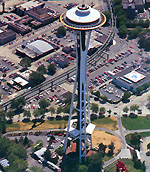 |
Seattle revised project details released (10/31/05) Seattle, Washington. As the final week before the November 8 election day begins, monorail supporters are once again hitting the streets to get voters to say yes to monorail. If voters say no to Proposition 1 on the Seattle ballot, the monorail project is no more. Indicating the true grassroots nature of the monorail project’s history, posters and fliers have been popping up all over the city as monorailists campaign to win at the ballot for a fifth time. They face an uphill battle, as polls have indicated a loss of public support since financing of the project became a hot topic in the summer. A modified 10-mile system plan costing billions of dollars less than originally proposed is what is asked for on the ballot. The pro-monorail campaign group, Transit Over Roads, is pleading for donations to air a commercial they have produced supporting monorail. The ad blames politicians and “a big money highway lobby” for standing in the way of the monorail project. Monorail supporter Blair Johnson told KOMO TV "If we can get grade separated transit at the same cost as transit that is partially at grade, where it is going to be slower at grade, we can be going 50 mph, non-stop between stations. That is what is going to make transit use more practical for working adults in Seattle to use." Monorail Supporters Walk The Green Line. KOMO TV, 10/29/05. Transit Over Roads pro-monorail TV commercial |
|
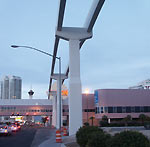 |
10
million mark in Las Vegas (10/29/05) |
|
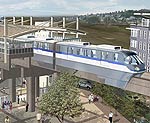 |
Seattle revised project details released (10/20/05) Seattle, Washington. The Seattle Monorail Project (SMP) has released more details on the revised plan for a 10-mile, 12-station phase one system from Interbay to West Seattle via downtown. The remainder of the originally planned 14-mile Green Line would be completed if the City approves construction permits following review of SMP’s Finance Plan. As the mayor-forced monorail measure is making its way into the homes of absentee voters and it’s only two weeks before the November 8th election, a city consultant’s report has been released that raises more questions about the financial aspects of the project. Monorail proponents were quick to react to the suspicious timing of the consultant report’s release and its findings. SMP Board Chairwoman Kristina Hill said, “I don't see what the basis is for looking at this now, except for influencing the election in some way.” Peter Sherwin, who heads up the Transit Over Roads pro-monorail campaign, told the Seattle P-I “I couldn't understand why the council needs to report on a rejected plan just as the absentee ballots are going out." Monorail proponents believe that large amounts of the new report are based on the Board-rejected finance plan of July. The SMP Board approved a new finance plan line yesterday. Meanwhile the Seattle press continues to hammer away at monorail. Both the Seattle Times and Seattle P-I have endorsed a no vote against the monorail, and negative stories on the monorail project continue to appear in the papers on a regular basis (latest article links below). One international publication sees things a bit differently. Infrastructure Journal highlighted the numerous achievements of SMP and Cascadia Monorail Company and commented, “The biggest stumbling block is a lack of support from the mayor’s office.” That article is available in pdf format on the recently upgraded Cascadia Monorail website. Seattle Monorail Project updated project page Transit over Roads website. Pro-monorail website. Report warns monorail finances are risky. Seattle Times, 10/25/05. Monorail's estimates raise questions – again. Seattle P-I, 10/25/05. Seattle Monorail board OKs new financing plan; will voters? Seattle P-I, 10/25/05. |
|
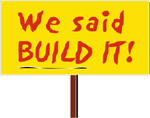 |
Seattle project trimmed by $7 billion (10/20/05) Seattle, Washington. Will $7 billion dollars in cost reductions save the monorail project, or has the project’s damaged reputation doomed the plan already? That’s the question of the hour, and Seattle voters will decide the Green Line’s fate once and for all in a few weeks. Monorail planners responded to the outrage of citizens and politicians over the once $11.1 billion price tag by shortening the line and acting to reduce costs. The high price tag was the result of creative financing to try to get the full 13.9-mile system built with motor vehicle tax revenues that have been coming in less than expected. Now the Seattle Monorail Project is proposing a 10-mile starter line that would cost about $3.9 billion, which includes $1.7 billion in construction and operational costs plus interest on bonds. Active campaigning to build the monorail has begun by the seemingly tireless monorail grassroots army. Banners and fliers have appeared all over the city and a new website has been established to promote the passage of Proposition 1. Transit over Roads website. The vote MONORAIL YES campaign site. Shorter monorail financing plan would shave $6.5 billion in debt. Seattle Times, 10/18/05. Shorten Monorail, save $7 billion. Seattle P-I, 10/18/05. |
|
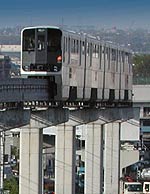 |
Honolulu leaders tour Tama Monorail (10/7/05) Honolulu, Hawaii. Honolulu Mayor Mufi Hannemann and members of the City Council have been given a tour of the Tama Monorail. Hitachi, Mitsui & Company and Kajima Corporation are joining forces to pitch for monorail in Honolulu. The Mayor and Councilmembers Donovan Dela Cruz, Todd Apo and Rod Tam first toured the Tama Monorail control facility, then took a 30-minute excursion on the 16.0 km system. The Mayor contends that a 0.5 percent general excise tax surcharge, approved this past summer in Honolulu, must be collected on time to avoid any delays in developing a fixed guideway system. Critics are asking for a more detailed plan before the tax is levied. Mazakazu Ishikawa, official for Hitachi, touted the advantages of monorail and tried to dispel concerns over monorail structures sometimes being perceived as ugly and blocking views. "The structure is actually streamlined. They can have a lot of shrubbery and greenery around so it almost appears as if the monorail is running through a park," Ishikawa said. If Honolulu selects the Japanese team to build a system in Honolulu, Mitsui would oversee the project while Kajima builds the infrastructure and Hitachi builds the trains. Mayor gets look at Tokyo monorail. Honolulu Star Bulletin, 10/7/05. |
|
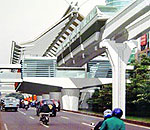 |
Indonesian trains for Jakarta (10/4/05) Jakarta, Indonesia. Indonesia is following in the footsteps of Malaysia by developing their own Alweg-type monorail system for the Jakarta Monorail. The engineering firm PT Bukaka Teknik Utama is being contracted by PT Jakarta Monorail and the government of Jakarta to design the system. Bukaka Teknik Utama is part of a consortium developing the monorail, which also includes PT Inka, the state-owned railway plant, and PT Len, a state-owned electronics and energy firm. The Indonesian four-car train will have a total capacity of 700 passengers. Bukaka engineer Teguh Nugraha Kusnan tells us that their train will cost less than half that of an equivalent Hitachi monorail train. 2006 is targeted for completion and testing of the first prototype vehicle. The first complete train set would be completed sometime in 2007. Siemens may provide the signaling system (ATP, ATS, etc.) and power supply, not the vehicle as has been previously reported and speculated upon. PT Bukaka Teknik Utama website PT Len PT Inka TMS Alweg Technical page |
|
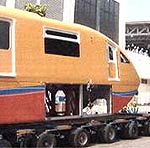 |
Hitachi
trains arrive in Singapore (9/26/05) New
Sentosa Express trains arrive at Palawan Beach Station. Channel
News, 9/26/05. |
|
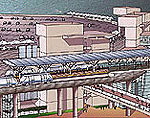 |
Oakland
Airport Connector to use private investment (9/16/05) BART may raise fares from airport to Coliseum. The Argus, 9/26/05. |
|
 |
Fifth
time for Seattle voters (9/24/05) City
says no but 'godfather of monorail' still thinks yes. Seattle
P-I, 9/24/05. |
|
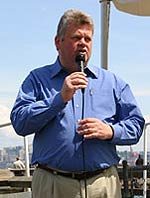 |
Seattle
mayor withdraws support (9/16/05) Mayor
derails monorail. Puget Sound Business Journal, 9/16/05. |
|
 |
Seattle
Monorail Project approves plan (9/14/05) Seattle Monorail Project website |
|
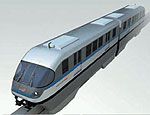 |
Options
for Seattle presented (9/7/05) New
monorail plan relies on old tax estimate. Seattle Times,
9/7/05. |
|
 |
More
study money for BART/Oakland Airport (9/5/05) Port
OKs $500,000 to study monorail. Oakland Tribune, 9/5/05. |
|